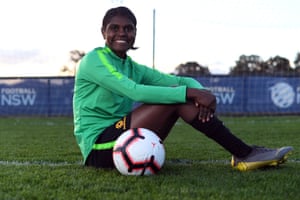One of the most striking parts of Saved!!!, a children’s book written by Matildas goalkeeper Lydia Williams, is not just that its main character is a young girl playing football. It’s that she is also Aboriginal. Based on her own upbringing in the deserts of Western Australia, the book traces how Williams discovered her love of sport and demonstrates the power of football in providing opportunity and community for one of Australia’s most marginalised groups.
“There are not many children’s books out there that have a young girl achieving her goals,” Williams tells Guardian Australia at Tuesday’s launch of Indigenous Football Week. “I feel like I had a really important and unique story to tell, and the only way it really could be told was through a kids book. It’s exciting to see that there’s a girl out there achieving her dreams and doing what she loves. Your journey is your journey, and your story is your story. It’s important to accept and be proud of where you’ve come from and what you’ve achieved.”
It’s perhaps no surprise that this is the book’s central premise given that marginalisation is where Australian football began. Ironically, despite being an introduced game, football was more welcoming to Aboriginal people throughout the 20th century than most other mainstream institutions. As John Moriarty, the first Aboriginal man to represent Australia, said: “Being Aboriginals, we didn’t have the chance to vote, and we were still second-class citizens in those days. I think the soccer fraternity embraced us, no questions asked.”
It was this shared marginalisation that saw football become one of the most diverse and progressive forces in the country; one that understood the contributions Aboriginal people can make both to sport and society. This week, then, it is worth asking where Aboriginal women fit into this wider story.
“The [female] players from back then paved the way,” Williams says. “They were still paying their own way to go on trips and wearing men’s strips. But the fact that they could do that then has really encouraged a lot of Indigenous people that it can be done. It would be lovely to see their stories being out there and highlighted more.”
As Aboriginal men like Moriarty, Gordon Briscoe and Charlie Perkins have become household names, Aboriginal women have remained doubly-marginalised; their football legacies affected not just by their race but also by their gender. Names like Karen Menzies, the first Aboriginal woman to represent the Matildas, alongside those of Bridgette Starr, Leonie Young (née Yow Yeh), Felicity Huntington and Belinda Dawney are hardly known despite these women playing just as important a role in football’s history as their male counterparts.
“When it comes to Indigenous Football Week, bringing out all the Indigenous people that played or represented their state or country [matters],” Williams says. “There’s always a bit of extra sacrifice there, whether that be through family, hardship, or financial – there’s always something there. Getting that recognition first is really important.”

Ros Moriarty, the managing director of the John Moriarty Football Foundation, which runs coaching and training programs in remote Indigenous communities, recognises that more needs to be done for Indigenous women and girls in football.
“It’s critical that the same focus is on bringing girls through,” she says. “Interestingly, if you look at the Matildas, they have a more recent track record of bringing Indigenous players through. The W-League also has more representatives than the A-League. So big focus needs to be on women because we’re seeing those results with probably not that much development in the recent past.”
Williams, along with Matildas teammates Kyah and Gema Simon, are the most visible examples of what Aboriginal women can offer football, and what football can offer them. Their steps are being followed by the likes of Western Sydney Wanderers goalkeeper Jada Whyman and Sydney FC winger Shadeene Evans, herself a product of the John Moriarty Football Foundation.
This is why stories like Williams’ are so significant: they add long-neglected voices to a national conversation about who does and doesn’t belong, not just in sport but in Australia more widely. “I think there’s a lot of uneducated people,” Williams says. “Nobody really knows the stories of what Indigenous people go through. A lot of people are actually curious about what life in the desert is like so I think it’s just understanding that and understanding culture on both sides.
“My parents have a multicultural background as well – my dad’s Aboriginal and my mum’s American – so they’ve experienced a lot of racism [due to] their marriage. What they taught me growing up is love and acceptance, and no matter what I’ve gone through, that’s how I’ve seen everything.”
Moriarty agrees: “Positive media and stories around the grassroots aspect of football and the power it gives families and communities to impact different outcomes for their kids [are important]. If we want to leverage the value that is within both Indigenous and women’s football, we’d love to see more media coverage to look at the innovation that’s happening – and tell more stories.”
Source link
